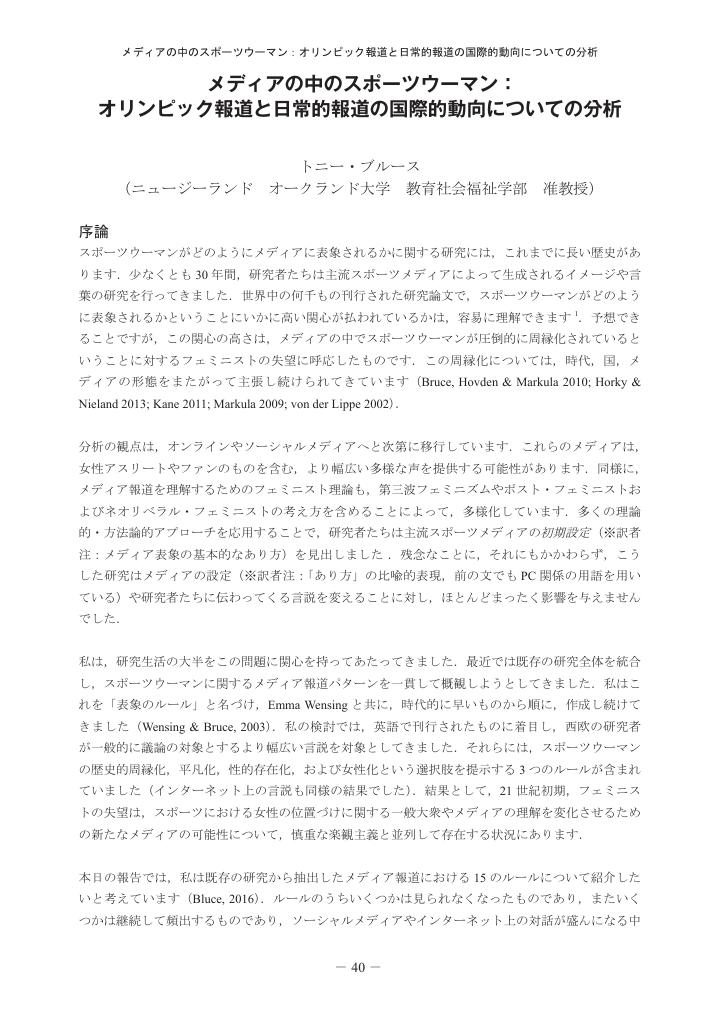28 0 0 0 OA 第6回IWG 女性とスポーツに関する世界会議にみるスポーツとジェンダーの今日的課題
- 著者
- 田原 淳子
- 出版者
- 日本スポーツとジェンダー学会
- 雑誌
- スポーツとジェンダー研究 (ISSN:13482157)
- 巻号頁・発行日
- vol.13, pp.202-215, 2015 (Released:2017-04-14)
- 参考文献数
- 6
5 0 0 0 OA オリンピック競技大会の招致問題に関する総合的研究
2 0 0 0 OA メディアの中のスポーツウーマン オリンピック報道と日常的報道の国際的動向についての分析
- 著者
- ブルース トニー 前田 博子 井谷 聡子 來田 享子 田原 淳子
- 出版者
- 日本スポーツとジェンダー学会
- 雑誌
- スポーツとジェンダー研究 (ISSN:13482157)
- 巻号頁・発行日
- vol.15, pp.40-52, 2017 (Released:2017-12-10)
- 著者
- 田原 淳子
- 出版者
- 社団法人日本体育学会
- 雑誌
- 体育學研究 (ISSN:04846710)
- 巻号頁・発行日
- vol.38, no.2, pp.87-98, 1993-07-01
The purpose of this study was to analyze the responses of foreign countries on the cancellation of the Games of the XII th Olympiad, Tokyo, 1940, and to clarify the principles underlying the arguments for and against the cancellation. The documents used for this study centered around the correspondence between Ministry of Foreign Affairs and Japanese governmental establishments abroad and the stored archives as to the Games of the Diplomatic Record Office of the Japan Ministry of Foreign Affairs. The findings of this study are summarized as follows : After the outbreak of Janpan-China War in 1937, there were many opinions against the hosting the Games of the XII th Olympiad by the city of Tokyo as well as the participation in it which were expressed mainly by European countries and U.S.A., together with those for expressed by U.S.A. and Brazil. Olympism seemed to be the basic and standard thought for these opinions, and it was interpreted into two ways so that opinions were divided and varied. Some of the experts took the position that Olympism should be the means and occasion for "realizing the peace of the world", and others took it should be "independent from politics". Thus, such a pre-war problem of boycotting as the Games of the XII th Olympiad in Tokyo appears to entail the similar post-war pattern of thoughts and interpretations in repeated boycott cases of the Olympic Games.
2 0 0 0 OA 013B06 第12回オリンピック東京大会の開催中止をめぐる諸外国の反応についての分析
- 著者
- 田原 淳子 木村 吉次
- 出版者
- 社団法人日本体育学会
- 雑誌
- 日本体育学会大会号
- 巻号頁・発行日
- no.41, 1990-09-10
- 著者
- 田原 淳子
- 出版者
- 社団法人日本体育学会
- 雑誌
- 日本体育学会大会号
- 巻号頁・発行日
- no.54, 2003-08-26
1 0 0 0 OA IOC ジェンダー平等とインクルージョン目標2021-2024
- 著者
- 來田 享子 田原 淳子
- 出版者
- 日本スポーツとジェンダー学会
- 雑誌
- スポーツとジェンダー研究 (ISSN:13482157)
- 巻号頁・発行日
- vol.20, pp.112-116, 2022 (Released:2022-11-20)
1 0 0 0 体育人と身体観(10)二階堂トクヨ(1880〜1941)
- 著者
- 田原 淳子
- 出版者
- 杏林書院
- 雑誌
- 体育の科学 (ISSN:00398985)
- 巻号頁・発行日
- vol.56, no.6, pp.457-461, 2006-06
- 著者
- 田原 淳子 木村 吉次
- 出版者
- 一般社団法人 日本体育学会
- 雑誌
- 日本体育学会大会号
- 巻号頁・発行日
- vol.41, 1990
1 0 0 0 OA 026E20804 体育・スポーツに関する国際会議決議文にみる男女共同参画の視座
1 0 0 0 OA 東アジアのスポーツ・ナショナリズム――国家戦略としての有効性と国際協調の展望
1 0 0 0 OA 人類のレガシー創造を目指す未来型オリンピックのビジョン構築
人類にプラスになるレガシー(遺産)をもたらす持続可能なオリンピックについて調査・検討を行った結果、オリンピズムの現代的解釈のもとに、大会を含むオリンピックムーブメント全体の見直しが肝要であり、具体的には、人権保障の遵守、競技種目の実施形態の多様化、All for Sports for All概念に基づくスポーツの普及・推進、自然と人的・社会的環境への配慮、オリンピズムを核とした、国際教養としてのオリンピック教育の普及・推進と文化プログラムの展開、計画的なレガシー創造とその活用等を、グローバルにローカルを加えた「グローカル」な視点で展開することが求められるとの結論が導かれた。






